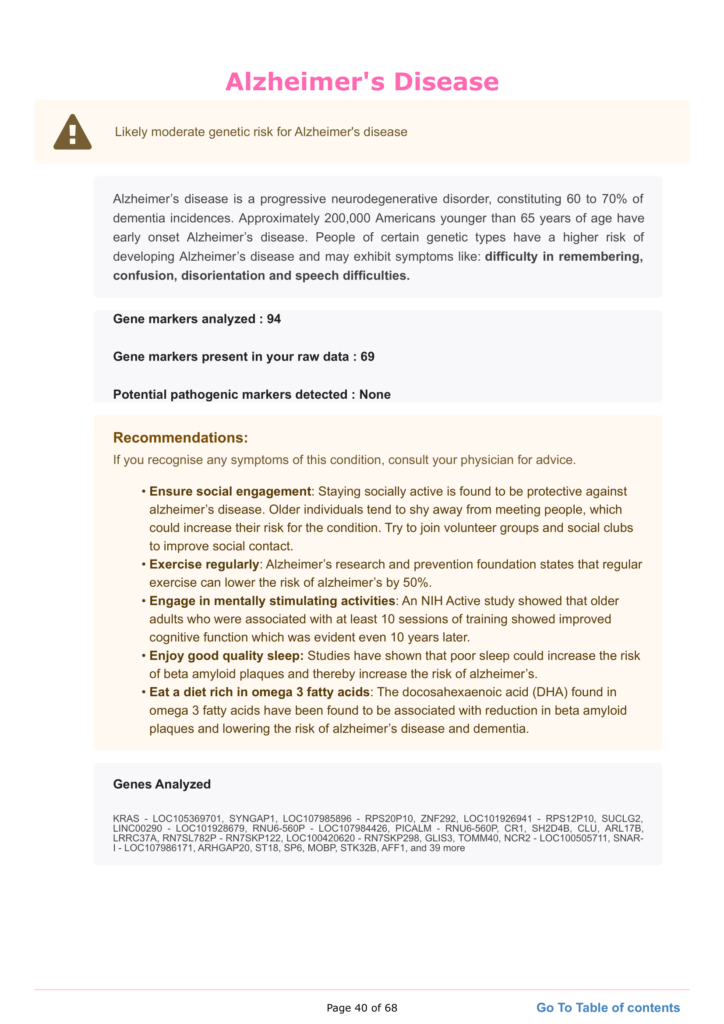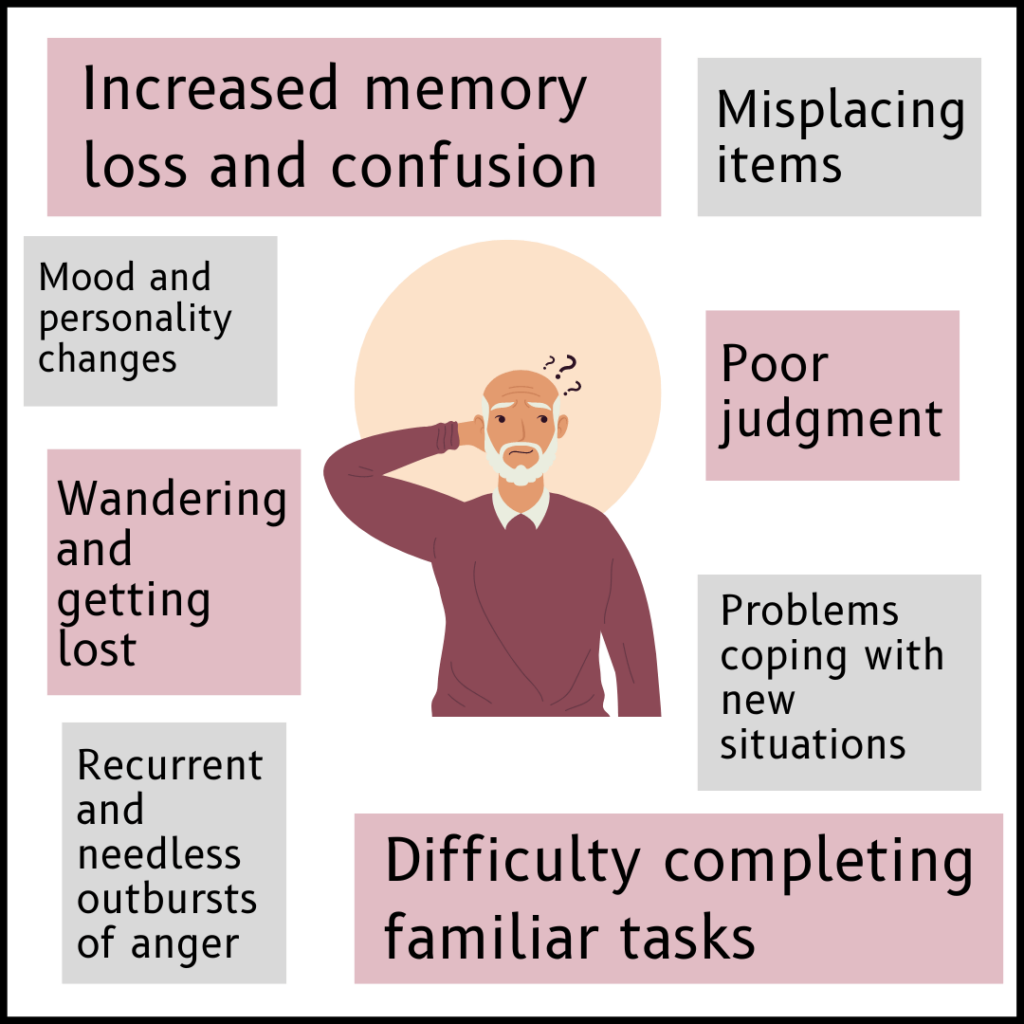Xcode Life's Alzheimer's DNA Report
Researchers have identified a number of genes associated with Alzheimer's disease.
While some genes increase your risk for developing Alzheimer's (risk genes), others are causal (deterministic).
In the sample report below, we've attempted to analyze some important genes that increase the risk for Alzheimer's.
You can identify your genetic risk of Alzheimer's by using your 23andMe DNA data and placing an order for the Gene Health Report.

What is Alzheimer's Disease?
According to the Alzheimer’s Association, Alzheimer’s disease is “a type of dementia that causes problems with memory, thinking and behavior.”
The disease is named after Dr. Alois Alzheimer, who first described it in 1906.
Symptoms usually develop slowly and worsen over time, eventually interfering with daily tasks.
It is caused due to a combination of different factors.
The risk for Alzheimer's disease has a genetic component to it.
While there is no current cure for Alzheimer’s, treatments are available to help manage the symptoms.
What are the Types of Alzheimer's Disease?
There are two types of Alzheimer’s Disease: early-onset and late-onset.
Early-onset Alzheimer’s is a rare form of the disease that typically affects people in their 40s and 50s.
Late-onset Alzheimer’s is the more common form of the disease and typically affects people over the age of 65.
Both forms of Alzheimer’s are progressive, meaning they worsen over time.
Early-onset Alzheimer’s progresses more rapidly than late-onset Alzheimer’s, but both forms ultimately lead to dementia.
Symptoms of Alzheimer's Disease

Causes of Alzheimer's Disease
The cause of Alzheimer's is still largely unknown, but scientists believe it is linked to a combination of genetic, lifestyle, and environmental factors.
One of the main theories behind the development of Alzheimer's disease is the build-up of abnormal proteins (amyloid plaques and tau proteins) in the brain.
This build-up damages the nerve cells and prevents them from communicating with each other.
When the brain cells get affected, the levels of neurotransmitters or brain chemicals used to send messages in the brain decrease.
One of these brain chemicals, called acetylcholine, is involved in learning and memory.
In the brains of people with Alzheimer’s, the levels of acetylcholine are lower.
As there is more and more plaque build-up, the brain cells die, causing the brain to shrink.
Although there is no cure for Alzheimer's, treatments are available to help slow its progression and improve the quality of life for those with it.
Is Alzheimer's Disease Genetic?
Both types of Alzheimer’s have a genetic component to it.
While some genes increase the likelihood of a person developing the condition, others guarantee disease development.
Late-onset Alzheimer’s
Most people with Alzheimer’s have the late-onset type.
The most commonly identified gene for this type is the ApoE gene, which is involved in making a protein that helps carry cholesterol and other types of fat in the bloodstream.
ApoE comes in different forms determined by the alleles e2, e3, and e4.
- ApoE e2: It is a relatively rare form that offers some protection against Alzheimer’s
- ApoE e3: It is the most common form and doesn’t influence Alzheimer’s risk
- ApoE e4: It increases the risk of Alzheimer's and is associated with an early onset of the disease
About 25 percent of people carry one copy of APOE ɛ4, and 2 to 3 percent carry two copies.
Some other genes that influence late-onset Alzheimer’s risk are (list not exhaustive):
- CLU: It produces a protein called clusterin. It influences the aggregation and clearance of amyloid beta plaques.
- CRN1: It produces the complement component receptor, a glycoprotein involved in Alzheimer’s pathogenesis, by influencing amyloid plaque and tau protein toxicity and immune dysfunction.
- SUCLG2: This gene produces a mitochondrial enzyme that plays a role in the clearance of amyloid beta 1-42. It is associated with the rate of cognitive decline in Alzheimer’s patients.
Early-onset Alzheimer’s
10% of all people with Alzheimer’s have the early onset type.
Research has identified 3 genes associated with this condition.
The APP Gene
The APP gene contains instructions for producing the amyloid precursor protein.
It is present throughout the body, mainly in the brain and spinal cord.
This protein is important for brain development and helps nerve cell movement and communication.
10-15% of early-onset Alzheimer’s is due to mutations in the APP gene.
The PSEN1 Gene
The PSEN1 gene contains instructions for producing presenilin 1, a protein that is a part of a larger complex called the gamma-secretase.
This complex plays a role in the fragmentation of proteins, especially the amyloid precursor protein.
Mutations or changes in the PSEN1 gene can result in abnormal chopping of the APP, resulting in amyloid plaque buildup, an important cause of Alzheimer’s.
The PSEN2 Gene
The PSEN2 gene produces presenilin 2 and works in a similar fashion to the PSEN1 gene to contribute to Alzheimer’s risk.
Is there a Treatment for Alzheimer’s?
There is no cure for Alzheimer’s disease; however, there are medications that can help to slow the progression of the disease and manage symptoms.
The U.S. Food and Drug Administration (FDA) has approved several medications for treating Alzheimer’s, including cholinesterase inhibitors and memantine.
These medications can help improve cognition, memory, and communication skills and reduce behavioral problems.
Clinical trials are ongoing to test new potential treatments for Alzheimer’s disease.
Summary
- Alzheimer’s is a condition characterized by progressive loss of memory along with behavioral and communication problems.
- 90% of all Alzheimer’s cases are late-onset, in which the symptoms are seen in the mid-sixties. Early-onset type is seen in 10% of the people with this condition.
- Alzheimer’s is caused due to the buildup of certain types of proteins (beta-amyloid and tau protein) in the brain, resulting in lower levels of several neurotransmitters like acetylcholine.
- Alzheimer's disease has a genetic component. The ApoE gene is well-studied for early-onset Alzheimer’s, with the e4 type increasing the risk of developing it.
- The APP, PSEN1, and PSEN2 genes are associated with late-onset Alzheimer’s risk.
- There’s no cure for Alzheimer’s; however, treatment options are available to treat the symptoms and manage dementia.




